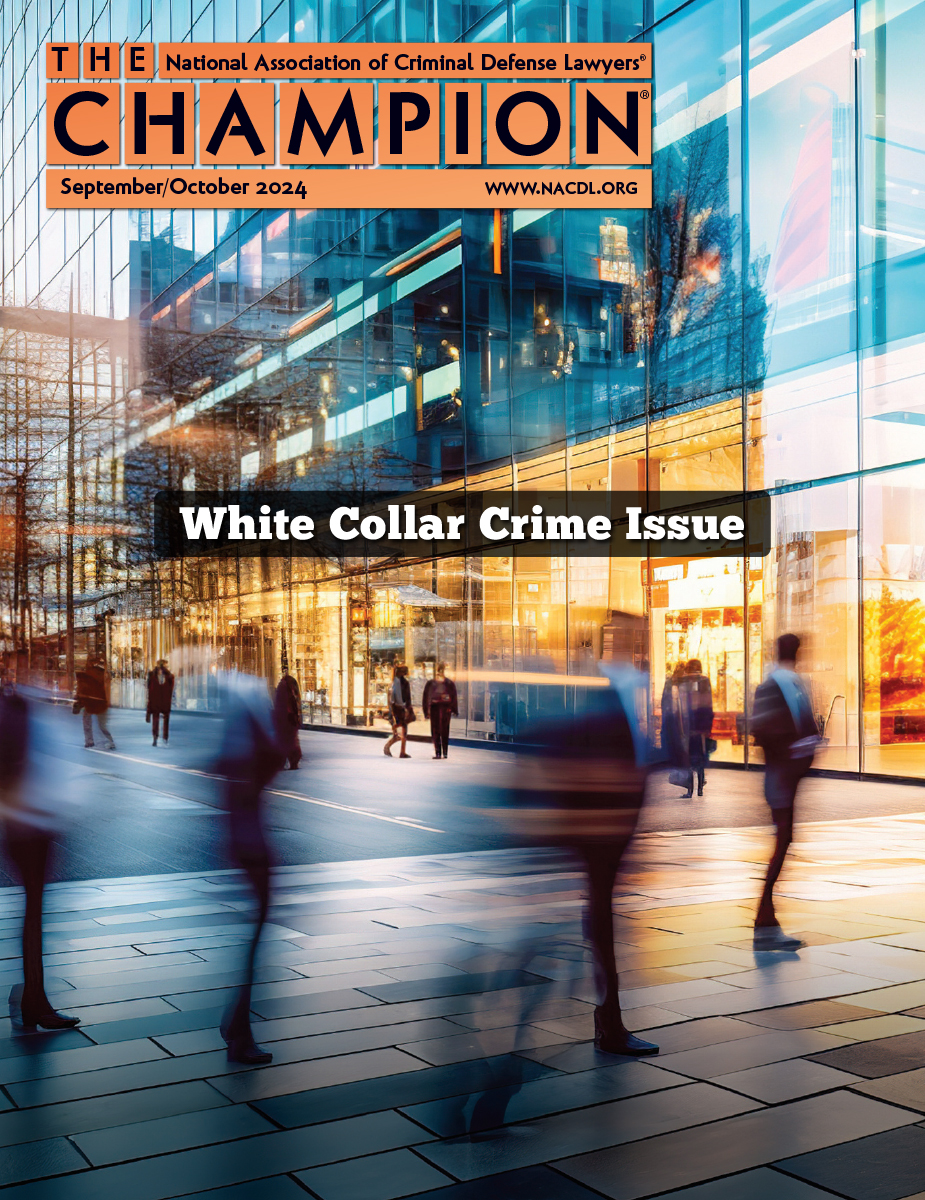September/October 2024

When the government uses data and summary charts during trial, defense attorneys should look for errors and sloppiness in the government’s analysis and find things in the data that the defense can use.
Articles in this Issue
-
Affiliate News
What events are NACDL affiliates hosting this month? Find out here.
-
Book Review: Reap the Whirlwind by Peter Houlahan
This month Chuck Sevilla reviews Reap the Whirlwind: Violence, Race, Justice, and the Story of Sagon Penn by Peter Houlahan.
-
Book Reviews: Witchcraft by Marion Gibson and The Ruin of All Witches by Malcolm Gaskill
This month Jon M. Sands reviews Witchcraft: A History in Thirteen Trials by Marion Gibson and The Ruin of All Witches: Life and Death in the New World by Malcolm Gaskill.
-
Data for Defense Lawyers
Defense attorneys must keep their eyes open to shield clients from the government’s improper use of data and summary charts. Moreover, defense advocates should look for ways to turn the situation around to their advantage. The defense team should look for errors and sloppiness in the government’s analysis and find information in the data that the defense can use. The failure to look at data is tantamount to leaving potential evidence on the table.
-
Framing the Third-Party Doctrine Around Society’s Dependence on the Cloud
Artificial Intelligence, and the Internet of Things
People use wearable technologies, smart home devices, and personal medical devices daily. These internet of things (IoT) devices collect and share information without human intervention. What are the public’s expectations of privacy in a world dependent on IoT, cloud computing, and artificial intelligence?
-
From the President: Aaron Burr Awaits
We are in the era of electronic discovery and ever-increasing information dumps. Defense lawyers are being provided with responses to discovery requests that contain terabytes of information. How do we advise a client concerning the strength or weakness of the government’s case if we must first examine and organize a terabyte of information?
-
It Is Time to Muzzle the Speaking Indictment
Speaking indictments are indictments that contain more facts and allegations than the law requires. These lengthy narratives permit the government to favorably influence the public perception of a case and impact the jury at trial. How can defense attorneys push back against speaking indictments?
Photo above: Special Counsel Jack Smith speaks during a press conference after Donald Trump is indictment on criminal charges by a federal grand jury in the 2020 election interference case in Washington, DC on Tuesday, August 1, 2023. | Credit: Bonnie Cash/UPI/Newscom
-
NACDL News: Illinois Prison Project Receives 2024 Champion of State Criminal Justice Reform Award
NACDL News for September/October 2024
-
NACDL News: NACDL Applauds Passage of Federal Prison Oversight Act
NACDL News for September/October 2024
-
NACDL News: New Report from NACDL Outlines How Marsy’s Law Undermines the Criminal Legal System
NACDL News for September/October 2024
-
NACDL News: South Carolina Lawyer Christopher A. Wellborn Installed as President of NACDL
NACDL News for September/October 2024
-
NACDL News: The Champion Wins Editorial and Design Awards
NACDL News for September/October 2024
-
NACDL News: Three Awards Bestowed at NACDL’s Albert J. Krieger Annual Meeting in Seattle
NACDL News for September/October 2024
-
Supreme Court 2023–2024 Criminal Law Review
During its 2023-2024 Term, the U.S. Supreme Court allowed criminal penalties for people who are homeless; blocked the ATF’s regulation of bump stocks; ended Chevron deference, a landmark doctrine of administrative review; and decided that U.S. presidents are immune from criminal prosecution for core constitutional acts taken during their tenure in office. Criminal defense lawyers will talk about these cases for years to come.
